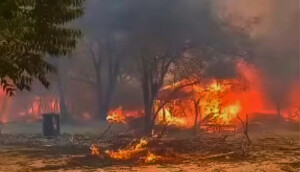Eastern Sudan conference concludes, but not without criticism
At the end of the Conference on Crucial Issues for eastern Sudan in Khartoum on Wednesday, 28 eastern Sudanese political parties and civil society groups signed an agreement stipulating the speedy implementation of the Eastern Sudan Track protocol. Resistance committees criticised the conference.
 The Conference on Crucial Issues for Eastern Sudan in Khartoum (social media)
The Conference on Crucial Issues for Eastern Sudan in Khartoum (social media)
At the end of the Conference on Crucial Issues for Eastern Sudan in Khartoum on Wednesday, 28 eastern Sudanese political parties and civil society groups signed an agreement stipulating the speedy implementation of the Eastern Sudan Track protocol. Resistance committees criticised the conference.
Ibrahim Ismail Jami, head of the conference’s preparatory committee, explained that the Conference on Crucial Issues for Eastern Sudan aimed to correct the imbalance between Sudan’s centre and the east and put an end to the marginalisation of eastern Sudanese and the absence of authorities in eastern Sudan.
Munir Saeed, a member of the conference’s preparatory committee, explained the contents of the agreements to reporters after the conference, which was held in Khartoum.
The new eastern Sudanese agreement adopts a federal system for the governance of the three eastern Sudanese states (Red Sea state, Kassala, and El Gedaref) while preserving the authorities of each state until the convening of a federal governance conference.
He said that the agreement stipulates the representation of eastern Sudanese “in all civil and military institutions” and fair compensation for the victims of conflicts in the region.
Saeed explained that a number of participants raised the issue of autonomy and self-determination.
The participants of the conference also stressed the need for unity of the eastern Sudanese on strategic issues and the criminalisation of racism and hate speech.
The main conclusion of the conference was the speedy implementation of the Eastern Sudan Track protocol.
The conference organisers stressed that eastern Sudan has been cut off from participation in power after the suspension of the Eastern Sudan Track in December last year on the request of the High Council of Beja Nazirs* and Independent Chieftains.
Jami said the agreement contains the documents of the formation of the Beja Congress in 1958, the peace agreements of Asmara (1995) and Juba (2020), the outcomes of the Sinkat, Shamboub, and Telkok conferences, and various other documents, including reports about the Port Sudan massacre that happened in January 2005.

The organisers of the conference have so far been keen to stress the widespread participation of political and civil society groups, even stating that the conference would be held with the participation “of all political parties, movements, civil society organisations, and resistance committees of eastern Sudan”.
However, the influential High Council of Beja Nazirs and Independent Chieftains and local resistance committees stressed that they did neither participate in nor were involved in the preparation of the conference.
Criticism
The Port Sudan Resistance Committees reported in a statement on Wednesday that they did not take part in the conference.
The grassroots committees considered the conference “a circumvention of the issues of eastern Sudan” and explained that they think the conference is used “for the purposes of a few people trading the demands of the people of the East”.
“The crucial issues of eastern Sudan belong to its people and should not be discussed in isolation, without involving the people in dialogue and decision-making,” they said.
'The resistance committees and most of the other political and civil society groups had nothing to do with the preparation of the conference' – Jaafar Khidir
Jaafar Khidir, an activist from El Gedaref, criticised the conference on Wednesday. “It is an attempt to search for a foothold in authority after reaching a settlement that will keep the putschists in power,” he said in an interview with Radio Dabanga’s Sudan Today programme.
“The resistance committees and most of the other political and civil society groups had nothing to do with the preparation of the conference,” he stated and accused the Sudanese authorities of “manipulating the issues of eastern Sudan and some of its civil and political leaders in order to stay in power”.
Khidir instead called for holding “grassroots conferences in all parts of eastern Sudan […] to address real issues, such as power and wealth sharing, and develop projects to compensate for the decades-long marginalisation”.
He further stressed the need for all eastern Sudanese to be united in order to overthrow the coup and establish a civil and democratic state.
Beja nazirs council
Earlier this week, Radio Dabanga reported that the High Council of Beja Nazirs and Independent Chieftains refused to attend the conference as they oppose the Eastern Sudan Track protocol.
The Beja nazirs council has opposed the Eastern Sudan Track since it was first agreed upon by the Sudanese government and the Sudan Revolutionary Front rebel alliance in the South Sudan capital of Juba in February 2020 as part of the Juba Peace Agreement.
The track was negotiated by the Beja Congress in Opposition and the United Popular Front for Liberation and Justice. The High Council of Beja Nazirs and Independent Chieftains was not involved in the Juba peace talks.
Last month, the High Council of Beja Nazirs and Independent Chieftains warned of the dire consequences of any political settlement in which the eastern Sudanese are not involved. They also highlighted that at least 39 Beja council supporters were killed in the past two years of protests against the Eastern Sudan Track.
* A nazir is a state-appointed administrative chief of a tribe, according to the native administration system in Sudan.











 and then
and then